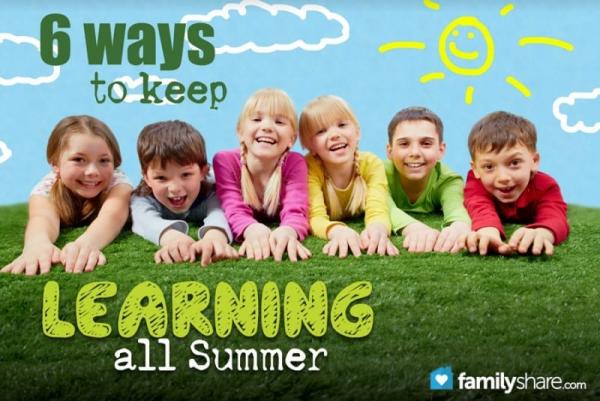
Most kids have fond memories of carefree summer days; swimming, popsicles and bike rides all figure prominently in my memories. But one of my most cherished childhood summer activities was trips to the library. Now that I'm a parent, I understand the value of retaining school skills during summer break. The National Summer Learning Association cites some interesting statistics, including a study that shows kids lose two months of math proficiency during summer vacation. Whether your kids have a traditional summer break, a shorter break from a year-round schedule, or are home-schooled, a casual summer learning routine will help them stay sharp during the summer months.
Summer learning can be more flexible, creative and spontaneous than school-year studies. Here are several ideas to get you planning your summer "school"� routine.
1. Reading
This is the number one learning activity your children should engage in, and it may be the simplest to implement. If you have access to a library, go often, and allow children to choose their own books. Many libraries offer summer reading programs and activities to supplement at-home reading. Consider reading a book as a family, and have older children read to younger siblings. Last summer, my oldest daughter put on "story time"� for her younger sisters and cousins. Make sure mom and dad are reading, too. We often go outside for our reading time.
2. Writing
Opinions differ about whether kids need to learn cursive, but most kids do need writing practice. Buy cheap notebooks and have your children decorate them. Do journal entries a few times a week with prompts like "My favorite summer activity is ..."� and "if I could take a trip anywhere, I would visit ..." More ideas can be found online with a simple search for "writing prompts."� Another way to encourage writing is to have kids choose a summer pen pal. This could be a grandparent or cousin who lives far away, or a friend who lives a few streets away. Getting mail is a novelty these days. Letting children decorate the letters with drawings or stickers will add to the fun.
3. Math
Teachers often spend time re-teaching information forgotten during summer months. Decrease your child's brain drain with small doses of math. I've tried several ways of doing this. One is to buy simple workbooks and have kids do a page a day. I've also tried brain and number puzzles like Sudoku. Small children love to be asked math facts and work with flashcards. There are several websites that offer free math worksheets, including freemathworksheets.net. Many schools subscribe to online math websites. Take advantage of your school's subscription, if applicable.
4. Science
Learning science during the summer is easy and fun. Take your kids stargazing and look for constellations using an app like Google Sky or a star chart for your region. Chart growth of plants in the garden after changing up variables like plant food and water, or track yield by the variety of plant. Buy an inexpensive science kit and do simple experiments like growing crystals. Learn about plants indigenous to your area and take a nature walk to see how many you can identify. Visit science museums as you travel, or make a special day trip to one in your area for hands-on fun.
5. Physical Education
It's satisfying to watch tired kids sleep soundly after a hard day of play. We try to rev up our physical activity by competing in local free track meets, bike riding to parks, swimming, playing games like tag and hide and seek and hiking. Summer is a time to enjoy outdoor sports you may not have time for during the school year. We've tried kayaking and canoeing, rock climbing and yoga barefoot on the grass.
6. Art
Most kids love to create, so get them crafting and using their imaginations. Messy projects can easily be moved outdoors, and art can be taken to a bigger scale, like driveway chalk masterpieces and cardboard box creations. Using items found in nature, like painting rocks to look like insects, is fun and easy to do in the summertime. I've been collecting ideas to try this summer.
For my family, a simple learning routine has become an important part of summer. We spend less than an hour a day on focused learning. A little bit of structure helps us use our days wisely. Consider adding in some learning to your fun this summer. But make sure you leave plenty of time for the most important work of childhood - play.

